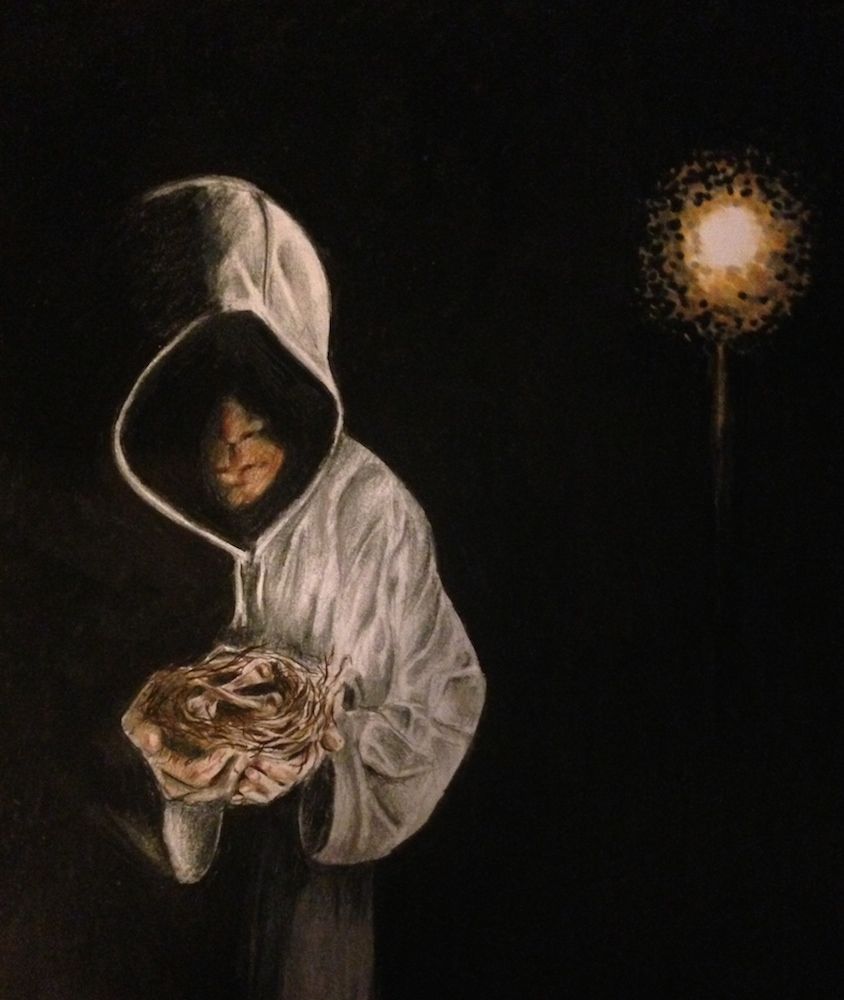
The following review is part of SmokeLong’s 20th-anniversary series looking back at beloved narratives in our archive. If you write reviews and you want to celebrate a particular narrative from the past 20 years of SmokeLong, dive into our archive and send us a review through Submittable. We pay a small honorarium for accepted pieces.
_________________________
by Sarah Holloway
Did Joseph Lucido know in 2014 what was coming down the pike? Did the ghost of Donald Barthelme? Lucido’s powerful flash opens unusually—with an epigraph from Barthelme reminding us that, like death and taxes, the horrors will come for us all. From the vantage point of 2023, the piece feels prescient.
The story details tragedies, mysteries and assorted mishaps surrounding the unnamed male narrator and his wife Vivian, “a radiant soul,” her name well-chosen, derived from vivus, Latin for “alive.” To live is to know horror.
It’s predictable that our pets die, our parents, too. That we will gather around their bedsides. That we will bury our pets and muddle through a time when “death begets death” and discuss it all over “pimento loaf lunches.” Yet with the passing of time we develop heartburn, an accumulated, foul miasma that hangs in our stomachs. Again and again in this short piece, Lucido makes every word count.
The narrator’s neighbor (Horace, another Latin name, this time that of a sometimes cynical, sometimes satirical poet) is murdered. A naked woman takes his place so that she can publicly starve herself in an attempt to stop violence. Her suffering’s the stuff of sainthood: she withers, moans, swells as her skin peels away. The public leaves her granola bars that “fester on the side of the road.” The stuff of Kafka, too. Yes, on one of its multiple levels, this flash resembles a Barthelmismo pinball machine.
How do the narrator and Vivian cope with these many unfortunate events? They grapple with each other late into the nights, hearing crickets sing over the starving woman’s complaints. Sometimes it’s all too much and they speak little. Just when it seems there is joy to be had (Vivian is pregnant), her father enters the fray with late-stage prostate cancer.
If the song of the crickets gives us hope, there’s still the matter of the ladybug infestation moving from the basement into the kitchen. What a horror indeed when the narrator straps on a gas mask to slaughter the bugs, “their bodies a wash of clicks” as he disposes of them.
Don’t forget the laughter from the woods and the fleshy animal bones that begin showing up on the front porch, attracting feral cats and raccoons. After the death of Vivian’s father, the narrator aims to find out who the “bone piler” is: he sees only a dark figure with a burlap sack who cannot be caught. Sounds like Skeletor or the Grim Reaper to me.
At the end of the flash, it is Christmas, a peaceful scene with pregnant Vivian in her rocking chair. The narrator has learned, though, that life is one damned thing after another and worries what “atrocity will bubble up from the mud.” He flinches at a sudden noise.
A charmingly absurdist interview with Michael Czyzniejewski accompanies this flash, sneaking in a few appropriately serious questions:
Does fatherhood terrify you?
More than anything, though I’m in love with the idea.
Yes, a careful reader notes this aspect of “The Horrors.” Fathers die, babies are born to create new fathers, and just about anything can happen in between. Fatherhood is a giant step, a wonderful one that also moves a man closer to his own death.
A close reading of this flash suggests coping skills may be influenced by gender. In the interview, Lucido says, “Vivian is clutch in big-life situations. You want her resolve every time.” It’s Vivian who buries the dead pets, a wild bird and even that bird’s shattered eggs. Vivian who holds the Christlike hunger artist in the neighbor’s front yard, nursing her sores and thanking her. Vivian who touches the narrator’s hand to reassure him at story’s end. This single aspect of the piece is strong enough to echo a favorite novel of mine, Anthills of the Savannah by Chinua Achebe. Both insist on the fundamental necessity of women’s contributions to any effort to heal our world.
I wondered at the beginning of this appreciation whether Lucido knew what was coming. I meant the horrors of recent years, ones mostly unanticipated in 2014—the pandemic, the Trump presidency and insurrection, reactionary attempts to fortify white racism and patriarchy, to whitewash the past—along with worsening of the known but disputed climate crisis. I imagine if I’d read this flash in 2014, it would have struck me as a somewhat fantastic, funny/sad flash, and an extremely clever one. Today this piece feels more possible, my reaction more visceral. Now I can more fully appreciate the horrible wisdom of Lucido’s narrative, too.
Read “The Horrors” by Joseph Lucido.
_______________________
 Sarah Holloway is a former tax accountant who’s now enjoying the writing life. She majored in English at George Mason University and lives in Savannah, GA. Her work has appeared or is forthcoming in Roi Fainéant, SugarSugarSalt Magazine and Emerge Literary Journal. She’s often found in SmokeLong workshops and her work was shortlisted for the SmokeLong Summer 2023 Fiction prize.
Sarah Holloway is a former tax accountant who’s now enjoying the writing life. She majored in English at George Mason University and lives in Savannah, GA. Her work has appeared or is forthcoming in Roi Fainéant, SugarSugarSalt Magazine and Emerge Literary Journal. She’s often found in SmokeLong workshops and her work was shortlisted for the SmokeLong Summer 2023 Fiction prize.

 Included in the price of SmokeLong Fitness:
Included in the price of SmokeLong Fitness: